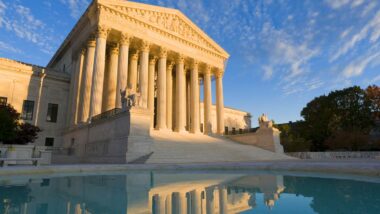Top Class Actions’s website and social media posts use affiliate links. If you make a purchase using such links, we may receive a commission, but it will not result in any additional charges to you. Please review our Affiliate Link Disclosure for more information.

Covid-19 vaccines may offer protection against the virus that caused a global pandemic, but not everyone wants to be immunized.
As the pandemic drags on, some employers now want to make vaccinations a stipulation for employment.
The impasse between individuals that don’t want a vaccine, and employers that want them vaccinated has grown into a controversy about whether employers can mandate vaccination for on-site workers.
Beyond infringing on the rights of workers, mandatory vaccinations may also infringe on an individual’s right to choose. So, how important is the freedom of choice to you?
The State of COVID-19 Vaccinations
A number of vaccine options from several different pharmaceutical companies are already in circulation. Moderna and Pfizer were the first ones to be distributed in the US. Several options are even considered extremely effective, with efficacy rates as high as 95 percent.
However, the emerging COVID-19 variants may create challenges for these vaccines.
A number of people have also expressed concerns about vaccine side effects, citing the emergency process used to quickly vet the shots.
As of Feb. 23, 2021, all states, including US territories, reported vaccination rates of less than 20 percent, according to the Centers for Disease Control (CDC). The CDC, which keeps a running tab of vaccinations on its website, reported a total of more than 96 million vaccinations delivered and over 76 million administered as of March 1.
The Pfizer and Moderna vaccines make up the vast majority of the doses used in the US and, according to current guidance by the CDC, require two shots for full effectiveness; however, regulators have been exploring the possibility of a one-dose vaccination. Johnson & Johnson recently received approval for its single-shot vaccine.
As of Feb. 24, 2021, just over 20 million Americans, or 6.2 percent of the population, had received both, according to the CDC.

Do Americans Want a Vaccine?
While some eagerly await their turn, a substantial amount of Americans have expressed hesitation about getting the coronavirus vaccines, which were approved by federal regulators under an emergency use process, skipping the full and lengthy vetting usually required.
While approximately 60 percent of respondents in a survey administered by the Pew Research Center said that they would likely get the vaccine when available, the remaining 40 percent ranged from wary to outright refusals.
Disease experts say that, in order to achieve herd immunity and end the coronavirus pandemic, between 75 and 80 percent of the population will need to be vaccinated.
Can the Coronavirus Vaccine be Mandated?
Legal experts say a national vaccine mandate would be unlikely.
“A vaccine mandate that requires that every man, woman, and child in America get a certain vaccine would be relatively unprecedented,” Carmel Shachar, JD and executive director of The Petrie-Flom Center for Health Law Policy at Harvard Law School told MedPage Today in an interview.
“Usually, when we think of vaccine mandates we limit them to if you want to send your child to school; or if you want to work for a certain type of employer, like a hospital.”
Indeed, in America where most people value individual freedom of choice, most of those surveyed by Pew rejected the idea of a required vaccine; however, a person’s ability to go to school, travel, and possibly work in certain industries may be predicated by proof that they are vaccinated against COVID-19, some experts say.
“I would not be surprised, as we get into the full scope of [COVID-19] vaccination, that some companies, some hospitals, some organizations might require [COVID-19] vaccination,” Dr. Anthony Fauci, director of the National Institute of Allergy and Infectious Diseases told Newsweek in a recent interview.
Several major companies have already made statements indicating that employees may be required to get one of the coronavirus vaccinations as a condition of returning to work.
In addition, Federal guidance issued in December says that employers may mandate a coronavirus vaccination as long as they accommodate workers with disabilities or religious objections. Accommodations can reportedly include changing an employee’s duties to remote work or requiring they wear protective equipment to come to their job.
Employer mandated vaccinations have precedent in certain industries, as well. In the healthcare industry, many workers are required to get an annual flu shot. In addition to healthcare, employers in the airline, travel, hotel, hospitality, and cruise industries are reportedly considering a vaccine mandate for workers.
Some employers are also reportedly concerned about their liability for workers who have not gotten the shot, in the event they transmit COVID-19 in the workplace. However, in a recent survey of essential employees, many responded that the coronavirus vaccination should not be required to work.
Workers’ concerns about being forced to get a vaccine or lose their job is becoming less theoretical by the day. A Wisconsin nursing home is facing criticism after laying off employees who refused to get vaccinated in January, according to a report by the Milwaukee Journal Sentinel.
“Mandating employees to receive a vaccine creates several legal risks for employers, including claims of disability and religious discrimination,” employment law expert Amanda Marie Baer told Healthline.
“Accordingly, it is smart for employers to instead incentivize employees to receive a COVID-19 vaccine and make it convenient for employees to do so,” she continued, recommending employers consider offering paid time-off to workers who get the shot.
 Could a Vaccination Be Required for School and Travel?
Could a Vaccination Be Required for School and Travel?
Even for those individuals who work from home or whose employer does not require it, a vaccination may be required for those who want to travel or attend school.
Proof of vaccination has been required for children to attend school for decades, although there are medical, religious, and even philosophical exceptions. Shachar told MedPage that students of all ages, including adults who want to attend university, will likely be required to get a COVID-19 vaccine as soon as options are widely available.
International travelers have also historically been required to show proof they have been inoculated against certain diseases, depending on the country. Most nations have implemented travel bans and restrictions during the coronavirus pandemic and could reasonably be expected to force travelers to get a vaccination or face a lengthy quarantine period upon arrival, according to experts who talked to CNBC.
Though there is not enough COVID-19 vaccines to go around yet, experts say that some sort of clearance may be required for those who wish to travel by plane or other mass transit systems. The details are still unclear, for example, if the mandate would come from the government or individual airlines or travel companies.
COVID-19 Vaccine Legislation
Legal experts say that employers can, for the most part, mandate COVID-19 vaccinations for their employees. However, exceptions will likely need to be made for those who cannot be vaccinated for medical reasons and for those with religious objections.
Some state lawmakers are trying to introduce legislation that would bar employers from mandating coronavirus vaccination as a condition of working.
“I just kind of like the idea of personal freedom, and that’s one of my biggest things as a legislator,” Republican state Sen. Dennis Kruse, who sponsored one such bill in Indiana, said according to a report by Pew Charitable Trusts.
Wisconsin State Senator André Jacque echoed this sentiment, telling reporters that getting the COVID-19 vaccination should be a choice for workers. Jacque is currently sponsoring a bill that would block employers from making coronavirus shots a requirement for their workers.
“Their choice of whether or not to receive a COVID-19 vaccine should not put their ability to make a living and provide for their family at risk,” he stated, according to Pew.
In fact, though the bills in Indiana and Wisconsin are sponsored by Republican senators, some of their Democrat counterparts agree.
The Maryland legislature is considering such a bill sponsored by state Del. Nick Charles, a Democrat.
“This is definitely not an anti-vaxxer bill. It’s none of that,” the lawmaker reportedly said of the legislation he proposed, with the hope it will protect frontline workers who do not feel that the vaccines have been shown to be safe.
However, such bills have run into hurdles. In addition, to Federal guidance that says that employers may mandate a coronavirus vaccination as long as they accommodate workers with disabilities or religious objections, these bills face criticism from national public health advocates and other health care groups who reportedly say that, in certain settings, those who choose not to get the vaccine are putting others at risk.
In North Dakota, three bills that would have stopped employers from mandating COVID vaccines for workers were defeated in the state legislature in January, reports NBC News. Similarly, this month, a bill that would have banned employers in Indiana from requiring any type of vaccine did not move forward when one of the bill’s sponsors failed to raise it in committee.
“The main concern is that this applies to all vaccines in all contexts,” Patrick Glew, a program manager for the Indiana Immunization Coalition, a nonprofit that advocates for vaccinations, reportedly said in testimony over the bill.
“If you do not have to get a vaccine for these [diseases] as a hospital worker, as a doctor, as a nurse, as somebody who works in health care, you’re not only making a decision for yourself,” Glew continued. “You’re making a decision for everyone else you treat, too. You’re putting them at risk.”
Though these and similar bills across the country have been dropped, those who say that vaccination should be a choice have pledged to keep fighting.
“We are just getting started,” Ashley Grogg, founder of Hoosiers for Medical Liberty which worked on the bill in Indiana, told Pew. “There’s going to be more to come next year.”
What do you think about COVID-19 vaccination mandates? Does it infringe on Americans’ right to choose or does it keep others safe? Tell us your thoughts in the comment section below.
Christina Davis has covered consumer protection and other legal news for Top Class Actions since 2014. She graduated from the University of Utah with degrees in Political Science and Environmental Studies and earned her J.D. from the University of Oregon where she was an editor for the Journal of Environmental Law and Litigation. After law school, Christina clerked for the Superior Court of Alaska and ran a private practice.

 Could a Vaccination Be Required for School and Travel?
Could a Vaccination Be Required for School and Travel?













31 thoughts on‘No Jab, No Job’: How Could a Mandatory COVID-19 Vaccine Affect My Rights?
Surprisingly, I don’t see a law suit mentioned in this article.